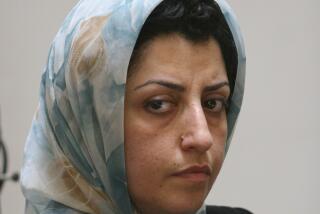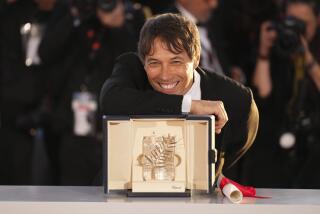Iranian filmmaking at two extremes
CANNES, France — Cinematically speaking, few countries have experienced as wild a roller coaster ride as Iran in the past 14 months. Over this period, one or more of its filmmakers have a) won the country’s first foreign-language Oscar, b) faced an extraordinary ban on filmmaking, c) seen their creative ferment recognized throughout Europe, d) packed up and moved their productions far from the Middle East.
“I guess you could say Iranian cinema is in both the best and the worst of times,” said Massoud Bakhshi, director of “A Respectable Family,” a semi-autobiographical tale about a man haunted by the Iran-Iraq war that premiered at the Cannes Film Festival last week.
Many of those extremes were indeed on display at the world’s most prestigious film confab. The country was represented by a pair of films, Abbas Kiarostami’s multi-generational drama “Like Someone in Love,” in competition, and Bakhshi’s “Family,” in the Director’s Fortnight. The two — warmly if not wildly received — represent opposite approaches taken by contemporary Iranian filmmakers: Kiarostami has chosen to shoot far from his native land while Bakhshi is attempting to tell his stories working within the system.
Meanwhile, Asghar Farhadi, the Oscar-winning director of “A Separation,” came to the festival to accept the European Union’s annual Prix Media, given for “best European film project.” It marks the first time a director from outside the Continent received the $77,000 prize. Androulla Vassiliou, the European Commission’s commissioner for Education, Culture, Multilingualism, Sport, Media and Youth, turned out in a pomp-filled ceremony to give him the award.
But the festival also highlighted how Iran, a country with a rich history of the arts and a nearly century-old filmmaking tradition, is facing a complex set of troubles. The festival was missing the frequent guest Jafar Panahi, an international-film mainstay who has come here previously with well-received movies such as the soccer dramedy “Offside.” Accused of supporting the protest movement that sprang to life after the disputed 2009 reelection of President Mahmoud Ahmadinejad, Panahi was convicted of national security violations and banned from making movies for 20 years.
And with censorship an ongoing issue in a country dominated by Islamists, its leading directors seem to be moving away from the country, not boring down in it.
Farhadi in many ways represents the best of times, having worked within the system to create films such as the missing-child drama “About Elly” and the legal-cum-family drama “A Separation.” Even the state was extremely proud of the Oscar win, boasting on government radio how it had beaten “the Zionists” (an Israeli nominee).
But despite his rising stock, Farhadi, who has no formal French connection but is beginning to develop relationships with French producers, is next taking his skills to Paris. There he will shoot a new film featuring the Gallic stars Marion Cottilard and Tahar Rahim, not Iranian actors or a Tehran backdrop.
“I think this next film could broaden my audience throughout the world,” Farhadi told reporters. He declined a one-on-one interview to talk about why he is taking his next production out of Iran, and a publicist bristled at the mention of Jafar Panahi, suggesting how sensitive matters remain at home. “Never ask Asghar about that,” she said.
Kiarostami is one of the leading lights of Iranian cinema, having made more than three dozen films, including “Taste of Cherry” and “The Wind Will Carry Us” over the past 35 years, many of them poetic depictions of everyday Iranian life, sometimes with a subversive undertone. His films have won the Silver Lion at Venice and the Palme d’Or at Cannes.
He is part of a generation that flourished after the 1979 revolution, when an anti-Shah current was in the air and the politics of revolution turbocharged cinema. But he has been frustrated by censors’ involvement in his work, and, at 71, has decided to give up on the country, at least for now.
“Ideally I’d like to go back to Iran,” the charming, slightly anxious filmmaker said at a beachside restaurant several days after his movie premiered. “Everything is more simple and natural there.”
Rather than formal restrictions on his work, he finds shooting in Iran to be a kind of death by a thousand paper cuts.
“When you’re making a film in Iran you can have all the permits and everything correct, and then you get to the day of shooting and you learn the guy in charge of the permits has changed his mind because you’ve broken some unwritten law,” he said. “And I don’t want to spend what little time I have left in my life sitting behind closed doors wondering whether I’ll be able to finish what I started.”
So he has made his last several films abroad, including 2010’s “Certified Copy,” an English- and French-language love story between a Brit and a French woman set in Tuscany, Italy. His latest is a Japan-set story of a call girl and a soft-spoken professor with whom she becomes involved. If there’s a trace of Iranian life or politics in it, it’s invisible to everyone but the director.
Kiarostami’s decision highlighted how difficult things remain in Iran. There are many film schools, but voices are suppressed in a de facto way too, by a government-controlled distribution system as well as a dearth of theaters.
Panahi has been perhaps the hardest-hit director. After receiving the ban in spring 2011, he decided to make a movie called “This Is Not a Film,” in which he is seen putting together a movie (and acting in one, because there is no official ban on him starring in a film) but not actually directing it. A clever meta workaround, the film played the Toronto International Film Festival and received attention on the world stage. But Panahi has not been willing to test the ban and make a traditional feature.
While Farhadi’s Oscar win would seem to offer new opportunities for filmmakers, directors in similar positions from other countries say it’s rarely that simple.
“Even if you leave aside censorship, there’s a myth that because one director won a prize it will get easier for an entire country of filmmakers,” said Cristian Mungiu (“4 Months, 3 Weeks and 2 Days.”), who five years ago was thrust in a similar position to Farhadi when he became the first Romanian to win the Palme d’Or. “From my own experience it’s just not true. One win doesn’t affect what films other people make, not unless there’s a cultural change in the country.”
While changing a culture from within isn’t easy — particularly in a system with government and religious pressures — some Iranian filmmakers say they relish the challenge.
Bakhshi is one of the directors who has decided to stay, and he believes he’ll make more nuanced films as a result. “It’s a lot easier sometimes to provoke and get arrested or just to go away to another country,” he said. “It’s a lot harder to make a movie within the system.” “Family,” his debut feature, indeed is made within that system — the script was scrutinized and eventually approved by the government.
The movie does offer criticism of vague corrupt entities who take advantage of the money the government gives to families of fallen soldiers. But what little explicitly political content it includes tends to offer a rosy picture of the government and Iran’s leadership during the eight-year Iran-Iraq war.
That war, and the tribal and religious forces behind it, actually had a positive affect on art, Bakhshi said. “The 1980s were a very special time because the government’s strict ban on all Hollywood movies [under Ayatollah Khomeini; it has since been relaxed] meant that we couldn’t see Hollywood movies,” he said. “So we were exposed to all these great works of art. I think I watched Kurosawa movies on TV.”
But just because filmmakers have the right tools doesn’t mean they’ll be allowed to use them. As Bakhshi got up when the interview concluded, he turned to a reporter and said, “Please be very careful how you quote me,” he said. “I still have to return to Iran.”
More to Read
The biggest entertainment stories
Get our big stories about Hollywood, film, television, music, arts, culture and more right in your inbox as soon as they publish.
You may occasionally receive promotional content from the Los Angeles Times.











